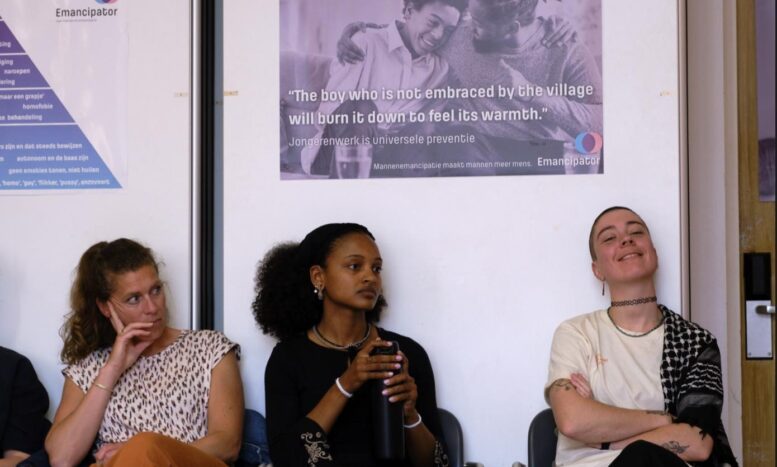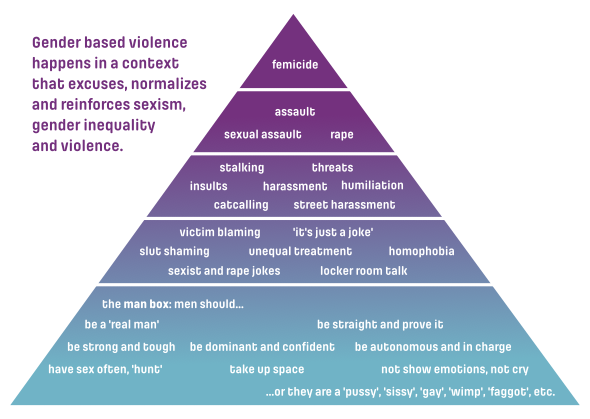Too often the core of the problem lies in oppressive masculinity norms – Jip Mars of Emancipator
‘Meet a Member’ is a regular feature in the global MenEngage Alliance newsletter. In this edition, we hear from Jip Mars (they/them), co-coordinator of MenEngage Europe, and Communications and Strategy Officer at Emancipator, a Netherlands-based organisation working to transform masculinities and promote gender justice.
What inspired you to work in this field? Can you share a bit about your journey?
My focus on men and masculinities work started around the topic of fatherhood, more specifically, paternal leave policies. At the time, in the Netherlands, fathers/non-birthing partners only got two days off work after having a baby.
Over the years, my politics have broadened towards a more general critique of gender, the patriarchy, and other oppressive systems, but it started there – which is funny because I can see now the role my dad had in raising me with explicitly feminist values.
Tell us about Emancipator’s work and how it relates to gender justice and masculinities.
Emancipator is the only organization in the Netherlands that explicitly focuses on engaging men and boys for gender equality. This is badly needed, because conversations about issues and problems involving gender often focus on women and LGBTQIA+ people, while too often the core of the problem lies in oppressive masculinity norms.
That is why we work for gender justice by engaging men and boys and challenging patriarchal masculinities. We work to prevent violent masculinities and promote caring masculinities, as a contribution to women’s and LGBTQIA+ struggles for equality, and the liberation of men from traditional ideas of masculinity.
When you think about transforming masculinities, what does that look or feel like to you?
For me, transforming masculinities is about being free to be the complete human that you are, in the fullness of everything that would be considered either feminine or masculine.
That freedom, to be fully human, can feel threatening to people who hold rigid ideas about gender and how men and women should be and act.
Can you describe what this looks like in practice?
Emancipator connects organizations, professionals and activists, and works to give them the tools, information and inspiration they need to promote men’s emancipation in diverse environments.
Emancipator cooperates with different partners in all kinds of projects and networks, through tailor-made trainings and workshops at schools, companies and other organizations, and with publications on all kinds of related topics. In this way, Emancipator works as a flywheel for transforming masculinities, at a local, national and international level.
What keeps you inspired and hopeful in this work?
Every year, Emancipator organises a weekend where 25 people who are socialised as men come together to talk about gender, masculinities and gender-based violence prevention. I love witnessing how men who have never met before can connect through sharing their personal, vulnerable stories.
Participants often tell us that these weekends are the first time in their lives they’ve felt truly safe being in a group of men — which is both heartbreaking and incredibly powerful. Being able to offer men this kind of transformative experience is what makes this work so meaningful.
Personal transformations like the ones I witness there are what keeps me inspired and hopeful in this work.

Is there a resource or tool you often use and want to share with others working in this field?
A tool that we use a lot is the pyramid of gender-based violence.

This is a great tool to show how work on transforming patriarchal and misogynist masculine gender norms contributes to gender-based violence prevention.
What impact has being part of the MenEngage Alliance had on your work?
Connection and community with other organisations and activists all over the world is just so inspiring and empowering.
To feel that we are not alone, that everywhere people are fighting the same fight.
Which parts of the MenEngage Core Principles or Accountability Standards resonate with you, and why?
Something that I find particularly inspiring is the explicit link that MenEngage makes in their analysis between patriarchy and the need for systems change, decolonization, and the climate crisis.
How have you used the MenEngage principles or framework in practice?
The accountability standards have explicitly informed our own accountability framework and our work on anti-racism and (other) intersectional positioning. Also, MenEngage’s Core Principles are helpful in making our positioning in the field clear.
To find out more about Emancipator’s work, check out their Facebook and Instagram accounts. You can reach out to Jip on LinkedIn.
